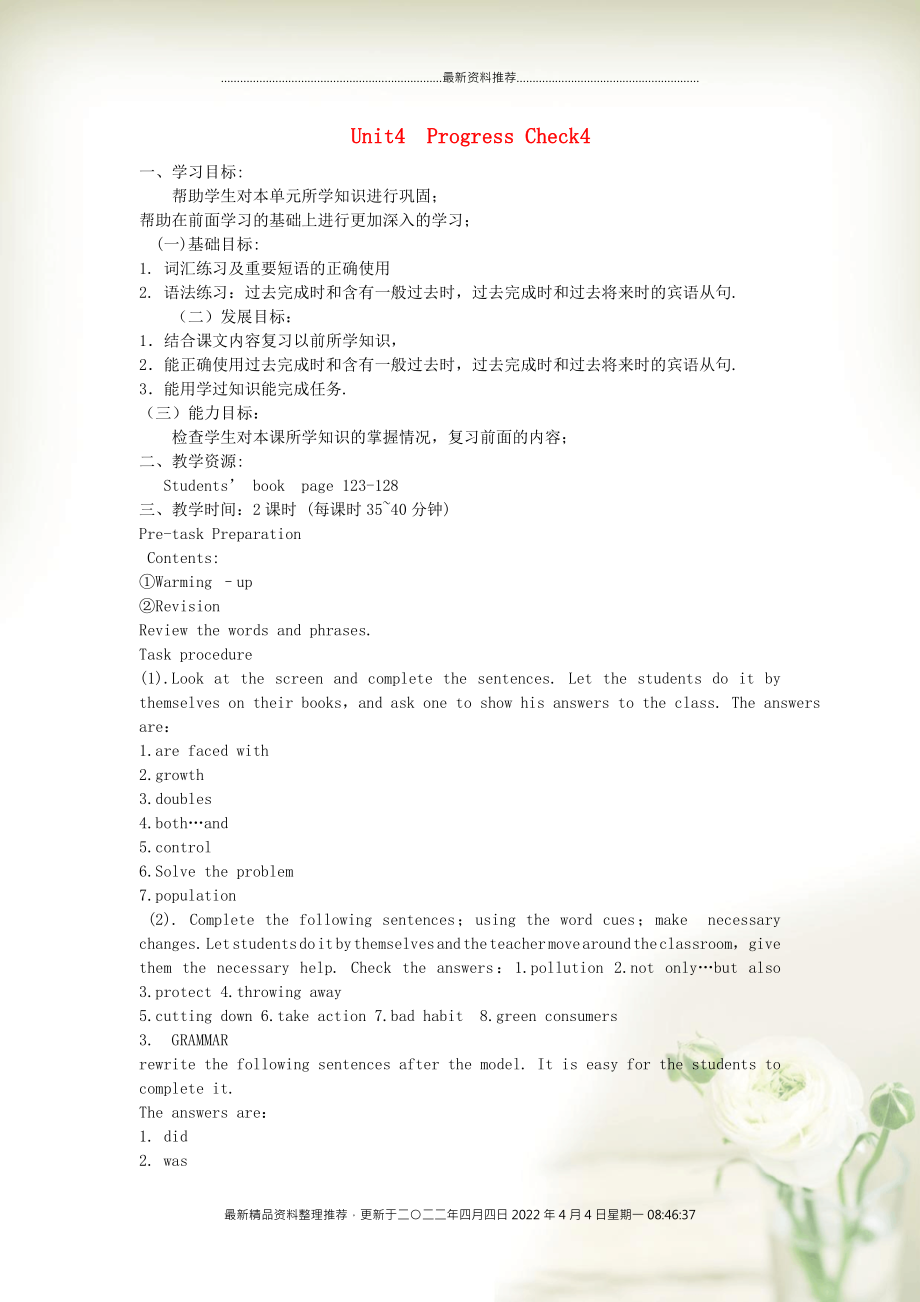《【金識(shí)源】八年級(jí)英語(yǔ)下冊(cè) Unit 4 Progress Check 4教學(xué)設(shè)計(jì)2 上海新世紀(jì)版》由會(huì)員分享��,可在線閱讀��,更多相關(guān)《【金識(shí)源】八年級(jí)英語(yǔ)下冊(cè) Unit 4 Progress Check 4教學(xué)設(shè)計(jì)2 上海新世紀(jì)版(3頁(yè)珍藏版)》請(qǐng)?jiān)谘b配圖網(wǎng)上搜索��。
1��、……………………………………………………………最新資料推薦…………………………………………………
Unit4 Progress Check4
一�����、學(xué)習(xí)目標(biāo):
幫助學(xué)生對(duì)本單元所學(xué)知識(shí)進(jìn)行鞏固��;
幫助在前面學(xué)習(xí)的基礎(chǔ)上進(jìn)行更加深入的學(xué)習(xí)���;
(一)基礎(chǔ)目標(biāo):
1. 詞匯練習(xí)及重要短語(yǔ)的正確使用
2. 語(yǔ)法練習(xí):過(guò)去完成時(shí)和含有一般過(guò)去時(shí),過(guò)去完成時(shí)和過(guò)去將來(lái)時(shí)的賓語(yǔ)從句.
(二)發(fā)展目標(biāo):
1.結(jié)合課文內(nèi)容復(fù)習(xí)以前所學(xué)知識(shí)���,
2.能正確使用過(guò)去完成時(shí)和含有一般過(guò)去時(shí)����,過(guò)去完成時(shí)和過(guò)去將來(lái)時(shí)的賓語(yǔ)從句.
3.能用學(xué)過(guò)知識(shí)能完成任務(wù).
(三)能力目標(biāo)
2��、:
檢查學(xué)生對(duì)本課所學(xué)知識(shí)的掌握情況��,復(fù)習(xí)前面的內(nèi)容���;
二�、教學(xué)資源:
Students’ book page 123-128
三���、教學(xué)時(shí)間:2課時(shí) (每課時(shí)35~40分鐘)
Pre-task Preparation
Contents:
①Warming –up
②Revision
Review the words and phrases.
Task procedure
(1).Look at the screen and complete the sentences. Let the students do it by themselves on the
3�����、ir books��,and ask one to show his answers to the class. The answers are:
1.are faced with
2.growth
3.doubles
4.both…and
5.control
6.Solve the problem
7.population
(2). Complete the following sentences�����;using the word cues����;make necessary changes. Let students do it by themselves and the teach
4���、er move around the classroom���,give them the necessary help. Check the answers:1.pollution 2.not only…but also 3.protect 4.throwing away
5.cutting down 6.take action 7.bad habit 8.green consumers
3. GRAMMAR
rewrite the following sentences after the model. It is easy for the students to complete i
5、t.
The answers are:
1. did
2. was
3. would plant
4. would be
5. had already drawn, would draw, put
2 Read the passage and choose the best answers
Tell the students to read the dialogues carefully�����,and think it over�,then complete it. First ask the students talk about his or her an
6、swers with classmates.
3.Listen and choose the best response to what you hear. First listen only, then do it the second time.
4.The past perfect tense.
一����、構(gòu)成方法
由 had 加動(dòng)詞的過(guò)去分詞構(gòu)成?! ?
二、用法說(shuō)明
■表示在過(guò)去某一時(shí)刻或某一動(dòng)作之前已經(jīng)完成了的動(dòng)作���,即“過(guò)去的過(guò)去”���。如:
She said she had never been to Paris. 她說(shuō)她從未去過(guò)巴黎��。
When the
7�����、 police arrived, the thieves had run away. 警察到達(dá)時(shí)�����,小偷們?cè)缇团芰恕?
By the time he was twelve, Edison had begun to make a living by himself. 到了十二歲那年��,愛(ài)迪生開(kāi)始自己謀生�。
注意:過(guò)去完成時(shí)是一種相對(duì)時(shí)態(tài)���,一定要有一個(gè)作參照的過(guò)去時(shí)間或過(guò)去動(dòng)作作比較���,否則,就不能用過(guò)去完成時(shí)���。
5. The object clause.
一.賓語(yǔ)從句的定義置于動(dòng)詞�、介詞等詞性后面起賓語(yǔ)作用的從句叫賓語(yǔ)從句�����。賓語(yǔ)從句的語(yǔ)序必須是陳述語(yǔ)序。謂語(yǔ)動(dòng)詞��、介詞�、動(dòng)詞不定式�����,v.-ing
8���、形式后面都能帶賓語(yǔ)從句���。有些形容詞(afraid,sure,glad等)之后也可以帶賓語(yǔ)從句。
1��、主句用一般現(xiàn)在時(shí)�����,現(xiàn)在進(jìn)行時(shí)或一般將來(lái)時(shí)等“現(xiàn)在”范疇的時(shí)態(tài)時(shí)����,從句的時(shí)態(tài)根據(jù)需要來(lái)用��,不受主句影響��。
2���、主句用過(guò)去時(shí),從句用與過(guò)去相關(guān)的時(shí)態(tài)���。
3�、從句說(shuō)明的是一般真理����、客觀事實(shí)、自然現(xiàn)象�、名言時(shí),仍用現(xiàn)在時(shí)���。
4��、從句中有具體時(shí)間狀語(yǔ)����,即使從句動(dòng)作發(fā)生在主句動(dòng)作前����,仍用一般過(guò)去時(shí)�����。
【Exercise 1】
1. These flowers are from Guangdong. He said.
? He said _______ these flowers _______
9�����、 from Guangdong.
2. Light(光) goes faster than sound. My teacher told me.
? My teacher told me _____ light _______ faster than sound.
3. There will be a meeting in five days. Jack didn’t know.
? Jack didn’t know _____ there _____? ____ a meeting in five days.
4. Can they speak French? I want to
10、know.
? I want to know ______? _______? _______? _______ French.
5. Are the children playing games? Tell me.
? Tell me ______ the children ______? ______ games.
四���、Homework:write a composition about how to protect the environment.
五�����、板書(shū)設(shè)計(jì):
Unit4 Progress Check 4
1.pollution
2.not only…but also
3.protect
4.throwing away
5.cutting down
6.take action
7.bad habit
8.green consumers
六����、教學(xué)反思:通過(guò)學(xué)生們的完成習(xí)題情況�,可以看出對(duì)本課知識(shí)掌握的較好。
最新精品資料整理推薦�����,更新于二〇二二年四月四日2022年4月4日星期一08:46:37
 【金識(shí)源】八年級(jí)英語(yǔ)下冊(cè) Unit 4 Progress Check 4教學(xué)設(shè)計(jì)2 上海新世紀(jì)版
【金識(shí)源】八年級(jí)英語(yǔ)下冊(cè) Unit 4 Progress Check 4教學(xué)設(shè)計(jì)2 上海新世紀(jì)版

